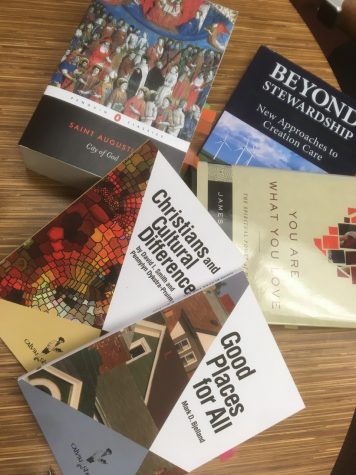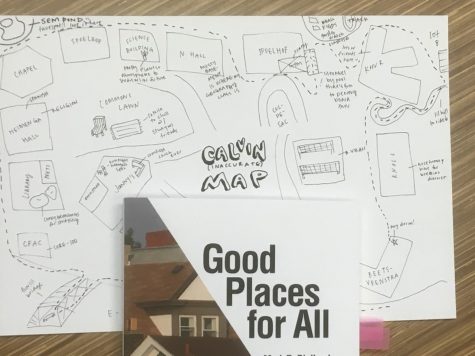

Professor Westra and students in conversation about order, authority and hope in “City of God”. Photo by Timothy Lin.
There’s a brand-new presence on Calvin’s campus this semester and it isn’t the murder hornets we heard so much about last year.
Approved in December of last year, the new Calvin Core is now fully implemented, bringing with it the first ever course with the designation “CORE”: Core 100. This course fulfills the “Community and Commitments” category and is intended to be taken during a student’s first year at Calvin. Now in the third week of its first semester, the new class was made possible by concerted effort from both the people who designed it and the faculty members from across disciplines teaching it.
Professor Joel Westra from the political science department chaired the University Core Task Force and the Transition Core Committee. According to him, Core 100 is a “foundational part of the new core.”
Jane Zwart, associate professor of English and African and African diaspora studies, said that when “a group of faculty gathered together to talk about what we hoped the course would give students, we talked about what First Year Seminar and DCM had provided students … and what parts of student learning in those courses we wanted to hold on to.” According to Zwart, the task of giving the course more structure then fell on the Core Fellows, a team which included herself, Professor Herbert Fynwever from chemistry and Professor Stacy DeRuiter from math and statistics.
Both FYS and Developing a Christian Mind, key courses in Calvin’s old core, passed into history with the introduction of the new core. FYS was a first-year course meant to help with the transition to collegiate studies, and DCM offered a wide range of topics to explore from a Reformed perspective during interim.
Core 100, however, was never just a replacement for FYS and DCM. Professor Carolyn Anderson, co-chair of the chemistry department and the current director of the Calvin Core, said that “CORE 100: Community and Commitments is designed to invite incoming students into a liberal arts education from a Reformed perspective, while introducing them to Calvin’s foundational commitments to diversity and difference in North America, global cultural competency and environmental sustainability.”
“We wanted to put a Reformed Christian lens before students, to introduce the tagged commitments in the new core curriculum, to foster spirited conversations across differences of opinion and experience and faith tradition, and to make students sure of their welcome in Christ … into the Calvin community,” Zwart said.
A foundation in liberal arts
Reformed liberal arts has always been one of Calvin’s buzzwords, and as it becomes re-encapsulated in this new foundational course, it is a mission that Calvin seeks to communicate to students.
In the view of English professor and former academic dean Elizabeth Vander Lei, liberal arts pushes us to reflect on the big questions of personal identity, the meaning of community, and the “telos” or goals we aim for in life. Citing a word often used in Calvin’s English 101 courses, Vander Lei said that the course is about “establishing basic threshold concepts for what Christian liberal arts education is.”

To Westra, liberal arts education is “education for free citizenship.” In terms of Reformed Christian education, he said, “we think about the nature of citizenship … as connected to being part of a political community but also being part of a broader and overlapping community … not just being connected, but being engaged in a way that can bring about restoration.”
The texts assigned in this course very strongly reflect these visions of education, as students anticipate themes of community, place, culture and even habit through texts by Calvin professors like “ Beyond Stewardship ” edited by Dave P. Warners and Matthew K. Heun, “Good Places for All” by Mark D. Bjelland, “Christians and Cultural Difference” by David I. Smith and Pennylyn Dykstra-Pruim and “You are What you Love” by James K.A. Smith.
At the foundation of the course texts is Augustine’s seminal work “The City of God.” Westra explained that there was a need for a “lens text” that would help students see the world through a Reformed Christian understanding. “The City of God,” Westra said, is a conversation that tries to answer the question of what it means “to be an engaged Christian citizen in a diverse world.”
The expertise required in this course thus ranges across academia. In Zwart’s words, “None of us is a theologian and an ecologist and a historian and an anthropologist and a philosopher and a political scientist.” In two main ways, the course pushed Calvin’s faculty together from across different corners of campus.
According to Zwart, philosophy professor Rebecca DeYoung and Westra used their expertise on Augustine’s work to help prepare faculty to “teach portions of that formidable book.” Faculty with expertise in the tagged commitments, biblical studies and pedagogical techniques also offered workshops and hosted conversations for those teaching Core 100. Zwart also said that each week, three to five faculty teaching the course at the same time are put into pods.
“This, for a lot of us teaching the course, I think, has been such an incredible gift. We’ve become a richer, more generous learning community as a faculty – thanks to Core 100. In fact, in many ways, we’ve practiced exactly what we hope our students will practice through this course and the new core,” Zwart said.
The student experience
Students taking Core 100 have responded to the course in diverse ways while forming initial understandings of the course’s purpose and coming up against its challenges. Chloe Padilla, a first-year student majoring in graphic design and Spanish, and a member of the artist collaborative, said that she sees the course as “a unique blend of English, religion and the arts,” and that she enjoys “the abstract perspective and the concern for a liberal-arts-related mindset.”
Rachit Kharel, a first-year student majoring in elementary education, said that he saw the purpose of the course as building up “the perspective that we think in and to teach us how the world and its components is viewed through a variety of lenses. It also prepares us to fit in the Christian environment as most of the topics (like Augustine and his beliefs) emphasize mostly on Christian perspective. ”
Sydney Boelman, a first-year student majoring in psychology, said that “This course has definitely shown me and taught me more about liberal arts. I am coming from a non-denominational background so when I get to learn about a different denomination I think it is cool to see where they are coming from.”

Many students have said that they found Augustine’s “City of God” a daunting text. “ Language-wise, it is super hard to understand him,” Kharel said. “That big fat book ‘City of God’ scares me with its size and heavy flowery language.” Kharel also said that the professor has provided supplementary material which, along with in-class explanations, has helped with understanding.
David Quain, a sophomore who took FYS last year and is currently taking Core 100, said that while the course explains liberal arts education, it “won’t cover the specific needs of international students such as how to write an email to their professors or how to blend in with culture here in the U.S.”
Many students mentioned that the discussion part of the class was their favorite. Quain specifically mentioned pod discussions, which he said gave him an opportunity to “hear more perspectives outside my own section.”
Under the new system, students are only required to take 40-50 credits of core courses. A variety of factors have also caused cuts to humanities and arts departments across the university. As a result, Core 100 will play an important role in delivering a liberal arts education, according to Vander Lei.“The liberal arts, and how we deliver the liberal arts for students, have changed across time and will continue to change,” she said. “The need to answer those basic questions that the liberal arts asks and tries to answer doesn’t change over time.”